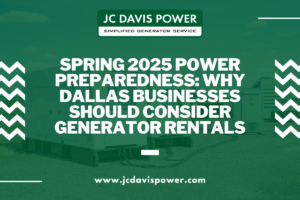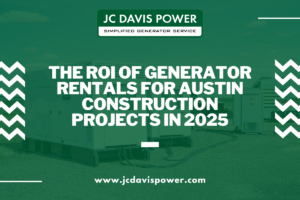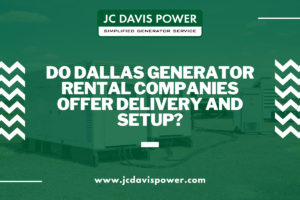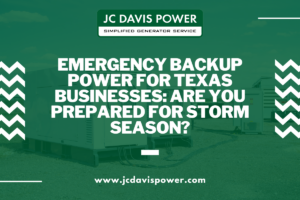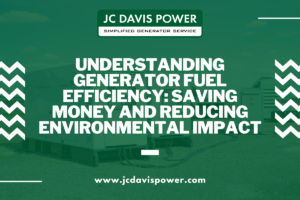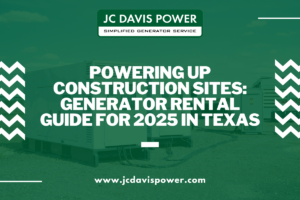Summer is prime time for outdoor home projects, construction jobs, and hobbyists firing up their creative spirits. But many of these undertakings require running power tools, appliances, lighting, or other electronics that standard residential electrical systems aren’t equipped to handle. This leads to the perfect opportunity to rent an industrial-grade generator for your summer needs.

Rather than purchasing a generator that will sit idle in your garage the rest of the year, generator rentals provide the ideal shortcut to power when you need it most. Professional rental companies offer quick delivery and hassle-free pickups once your summer projects wrap up. And with no long-term commitment or maintenance responsibilities, you can fuel up your summer schedule without weighing yourself down.
Types of Summer Projects Requiring Generator Rentals
Home Improvement Projects
Summer ushers in prime weather for tackling outdoor home upgrades or renovations. Maybe you’re landscaping your yard, installing exterior lighting, remodeling a patio or porch, or adding electrical circuits for a hot tub. Larger scale projects like whole-house generators also often take place when conditions are warm and dry. Specialty tools like trenchers, concrete saws, and air compressors have high power demands too. Renting a generator ensures you have sufficient electricity when working beyond your main electrical panel’s capabilities.
Construction and Renovation Work
From commercial buildings to residential remodels, construction projects ramp up when warmer weather arrives. Skilled trades like electricians, plumbers, and HVAC technicians depend on generators to temporarily supply energy during installations. Other contractors may need generators to run equipment like lifts, power washers, or welding gear at sites lacking electrical infrastructure. Rented generators provide reliable auxiliary power with the flexibility to scale up for larger job sites or voltage-sensitive applications.
DIY and Hobby Endeavors
Maybe you’re not contracting or renovating, but you still have some ambitious summer DIY plans or hobbies. Generators empower hobbyist woodworkers to fully utilize their table saws, lathes, sanders, and other high-draw tools outside home workshops. For mobile food vendors, generators run refrigerators, lights, cash registers, and more at locations lacking electrical hookups. Event coordinators also routinely rent generators to independently power stages, sound systems, lighting, and other event equipment. Backyard mechanics similarly benefit from having an electrical source for welding, compressors, and various auto repairs.
Benefits of Renting vs Buying a Generator
More Affordable Short-Term Solution
The most compelling incentive to rent a generator rather than purchase one is cost efficiency. While buying seems cheaper upfront, factoring in costs beyond the sticker price tells a different story. Maintenance, transportation, storage, and insurance all add up for owners, whereas rentals include these factors for a simple weekly or monthly rate. Rentals also avoid hefty installation charges to integrate purchased units with household circuits. For summer usage spanning just weeks or months, renting maximizes value and convenience without years of unnecessary costs.
No Maintenance Responsibilities
In addition to lower overall costs, generator rentals place the burden of maintenance squarely on the rental company. While owners must routinely service, repair, or replace components of purchased generators, renters avoid these hassles entirely. Reputable rental companies perform extensive inspection, testing, and preventative maintenance between rentals to optimize performance and reliability. Renters benefit from well-maintained equipment they simply return at project completion, with no long-term service demands.
Latest Generator Models and Features
Generator rental fleets also stay ahead of the curve, upgraded regularly with new models featuring the latest industry-leading features. Companies continuously invest in emerging technologies to enhance output, efficiency, safety, and user controls. Renters access these cutting-edge generators on demand without major investments. Buying a generator often locks owners into a static unit lacking modern updates as new products emerge. Short rental periods let users compare offerings to select the optimal generator for each unique event or worksite.
What to Look for in a Reliable Generator Rental Company
Industry Reputation and Experience
The first step in securing a reliable generator rental is choosing an established company with extensive experience serving your region. Check for longevity and a proven satisfaction track record catering to needs like yours. Loyal local construction firms who have rented from the same provider for years offer social proof. Also, verify all required licensing and insurance coverage. Reputable names stand out when you need dependable equipment handled professionally.
Extensive Rental Selection
Top rental companies also offer an enormous, ever-evolving inventory with diverse generator sizes, capabilities, and fuel options. Whether you need to power a single work trailer or an entire festival main stage, the right generator should exist within their fleet. From small portable inverter models to massive industrial towable units, a robust variety including both diesel and gas generators ensures ideal matching. Ask about available output ranges and voltage regulation to cover all electrical loads.
Delivery and Pickup Options
Generator rentals eliminate transportation logistics with delivery directly to your doorstep. This convenient perk alleviates the hassles of arranging vehicles to haul cumbersome equipment. Ask potential rental companies about their delivery capabilities related to your location, schedule, site access, and setup needs. Some even assist with generator positioning and connections as an added service. Just as vital is timely pickup when your project finishes, so clarify return processes upfront to avoid unneeded rental extension fees.
Fair Rental Terms and Rates
Rental costs understandably impact generator selections, so compare rate structures across promising suppliers. Consider the all-inclusive rates encompassing delivery, fuel, maintenance, insurance, and pickup. Breaking costs into weekly and monthly terms allows flexibility both for shorter weekend projects or more extended temporary power roles. Ask about fuel policies regarding refueling during rentals or return condition expectations. Confirm if additional charges apply for aspects like installations, towing vehicles, or special requests. Weigh overall value based on your distinct rental duration and electrical requirements.
Key Generator Features for Summer Use
Quiet Operation
Home improvement projects and neighborhood events demand generators with reliably quiet operations to maintain community relations. Major rental companies specify average decibel outputs helping choose suitable units, labeled at emission test distances. Quieter inverter generator models utilize advanced sound-dampening materials and enclosure insulation best suiting noise regulations in residential settings. Larger units may allow DIY sound attenuation customizations too. Compare ratings to local ordinances when working close to homes, or pick whisper-quiet generators from the start.
Eco-Friendly Fuel Options
Seeking out eco-friendly, low-emission generator rentals aligns with summer’s environmental awareness. Many feature advanced catalytic converters, ultra-low sulfur diesel compatibility, and selective catalytic reduction to curb air pollution and carbon footprints. Propane standards emit 70-90% fewer emissions than gasoline while reducing fuel costs. Battery or solar-powered generators optimize renewable operation, while hydrogen-blend models cut emissions further. Sustainability matters more each season, so specify green rental preferences upfront.
Sufficient Power Output
Matching generator capacity to your electrical loads ensures uninterrupted summer productivity without wasting excess fuel on overpowered units. Provide equipment wattage ratings to rental suppliers so they advise properly sized options. Remember, the output must exceed total startup watt peaks across all concurrently running devices, not just continuous rated wattages during use. Leave buffer room for tools with variable loads or future expanded equipment purchases to maximize your investment all season.
Portability
Mobility also simplifies repositioning generators to work sites around your property as needs evolve. While towable standby units offer the highest capacities for centralized whole house coverage, compact portable inverter models provide personalized power for smaller weekend projects. Lifting handles and wheel kits enhance portability for DIYers migrating job sites. If accessing steep terrain, inquire about all-terrain transport carts to securely convey units over obstacles other wheels can’t handle. Prioritize maneuverability fitting your workload and property layout.
Estimating Required Generator Size and Fuel Needs
Right-Sizing Wattage Capacity
The first step toward estimating requisite generator wattage is creating an itemized list of all tools, appliances, and devices you plan to simultaneously operate. Next to each, record typical voltage and wattage ratings from device labels or manuals. For devices with a listed amperage rather than wattage, simply multiply by the voltage to convert to watts.
With your wattage list assembled, total the standalone running watt figure for each item that will run concurrently when in use. This cumulative figure equals your necessary generator output to prevent overloading beyond capacity while in use. Remember, starting wattage spikes draw 2-3x higher than running watts when devices first turn on before settling, so substantially overestimate to allow for inrush current demands.
Finally, compare your total to various generator sizes and select the next higher output capacity as an adequate margin of safety. This ensures you have some buffer to accommodate unexpected demands that pop up mid-project. Consider future device purchases too so that rented capacity flexibly scales up over time alongside growing tool collections.
Calculating Fuel Efficiency
Generator output capacity may satisfy electrical loads, but limited fuel tanks require ongoing monitoring and refueling to avoid disruptive mid-job stoppages. Fuel consumption rates vary widely based on load levels, so first cross-reference your total wattage demand against the generator’s output rating to estimate typical load percentages you will sustain.
Next, locate the generator’s “load versus runtime” chart, displaying estimated hours of operation per tank at each load percentage bracket. Find your load level row and note runtime duration to gauge refueling frequency. If unavailable, request aggregate fuel consumption rate specs from the rental company to manually formulate an appropriate runtime estimate.
Remember, runtimes are merely approximations. Monitor usage to log actual average hourly fuel consumption based on your loads. This intelligence informs ideal refueling cycles and the extra fuel volumes to keep on hand so summer passion projects never lose momentum.
Safety Tips for Operating Rental Generators
Follow Electrical Cord Guidelines
Anytime you introduce new electrical devices and connections outdoors, safety should take priority. While convenient for mobility, traditional household extension cords pose tripping risks and cannot safely convey generator power for high-watt tools. Use thick, industrial-grade cords specifically rated for your generator’s voltage and amperage output range. Restrict cord lengths under 50 feet and inspect for defects like worn shielding or cracked insulation before use. Also, take care to keep cords out of walking paths or puddled water to prevent electrocution or fire hazards that could abruptly end your summer.
Ensure Proper Ventilation
Both gasoline and diesel generators pose dangerous carbon monoxide risks if breathed in enclosed spaces, plus potential fire threats from spilled fuel vapors. Always operate generators with at least 5 feet of clearance outdoors away from doors, windows, and vents where exhaust can safely dissipate without entering occupied buildings. Point exhaust away from dwellings as added protection while keeping approved fire extinguishers nearby when refueling. These basic precautions safeguard summer relaxation from turning tragic.
Follow Refueling Protocols
Take equal care when refueling rental generators as you would for a car or lawn mower. Avoid overfilling tanks and touching nozzles to container openings when dispensing to prevent static discharge-related fires. Set containers on level ground rather than holding them aloft, close fuel caps tightly after filling, and promptly clean up any spills. Wait at least two minutes after the generator shutdown before removing fuel caps to allow residual vapors to dissipate, reducing ignition risks. Your diligence protects equipment investments so projects finish safely and successfully.
Let the Summer Projects Begin!
Don’t let inadequate electricity throttle your summer property improvements, events, hobby interests, or professional endeavors. Generator rentals deliver flexible auxiliary power perfectly scalable to your unique project requirements. Reputable rental companies like JC Davis remove transportation, maintenance, and storage burdens with delivery directly when and where needed most.
For any guidance on generator rentals this summer, contact us for assistance.
